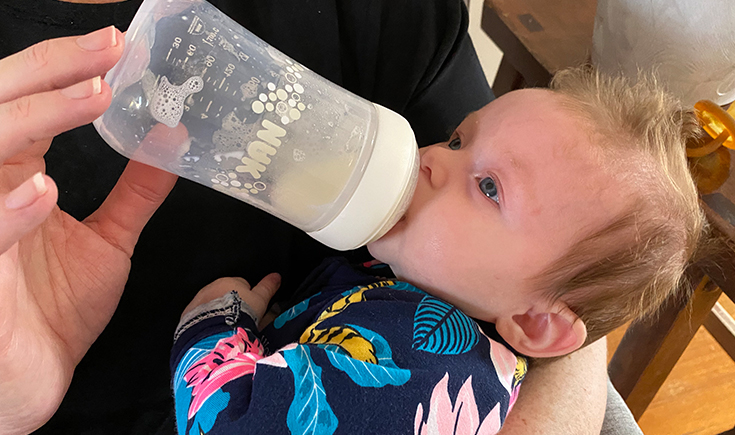

Around 1 in 10 children have a reaction when they drink cow’s milk or formula made from cow’s milk. This could be due an intolerance to lactose or a milk allergy. A cow’s milk protein allergy (CMPA) is much more common than lactose intolerance, and many children will grow out of it, usually by the age of 3-5 years. An allergy occurs when a child’s immune system reacts to the protein in milk.
However, not all children will outgrow a cow’s milk protein allergy. Severe life-threatening allergic reactions (anaphylaxis) require immediate medical attention, so call 000 if your child is:
- wheezing or having difficulty breathing
- has a swollen tongue
- is vomiting
- they are pale and floppy or unconscious
Does my baby have a cow’s milk protein allergy?
The signs and symptoms range from colic and reflux, to constipation, diarrhoea and crying. It can make diagnosis tricky, so set up an appointment with your GP if you think your baby is suffering from an allergy.
If your baby displays one or more of the following rapid onset reactions usually within 15 minutes and up to 2 hours of consuming cow’s milk or other dairy products:
- hives
- swelling of the lips, face, or eyes
- abdominal pain
- vomiting and/or diarrhoea
Delayed reactions can occur after 2 or more hours of consuming cow’s milk or other dairy products, and include:
- increase in eczema
- delayed vomiting and/or diarrhoea 2-24 hours after having milk
- blood or mucus in stools
Other general symptoms associated with CMPA that can appear immediately after, or hours (or even days) after to watch out for include:
- reflux
- refusal to feed
- colic
- runny nose
- chronic cough
- fatigue
- restlessness
- poor sleeping
What is the diagnosis of a cow’s milk protein allergy?
Diagnosis is usually easy if a baby is showing symptoms soon after consuming dairy. Your doctor will confirm it by taking your baby’s medical history and using allergy tests (skin tests or blood tests).
If your baby has delayed reactions, allergy tests may show as negative, so see a specialist paediatrician and/or clinical immunology/allergy specialist. To confirm a diagnosis this way usually involves eliminating dairy from the diet for a trial period, with a planned reintroduction of cow’s milk and other dairy foods. Always do this with the support of a medical professional.
What is the treatment of a cow’s milk protein allergy?
If your baby has been diagnosed with a cow’s milk protein allergy, you will need to completely remove dairy products from their diet. You may also need to remove other products from other sources, such as goat’s milk and coconut milk. Read food labels carefully if your baby is on solids (your doctor or allergy specialist should give you a list of ingredients to avoid).
Some children can tolerate food with cooked or baked cow’s milk, such as in muffins or cakes, but before introducing these foods, speak to your allergy specialist.
All people with a food allergy need an ASCIA Action Plan to help manage an allergic reaction, so be sure to share it with anyone who is caring for your baby. You may be required to carry a prescribed epipen if your baby has severe allergic reactions.
If your baby is formula-fed, you will be able to use a soy protein formula (unless they’re allergic to soy), extensively hydrolysed formula, or amino acid-based formula (read more about how to choose the right baby formula).
If your baby is breastfed, you will need to remove all dairy from your diet. Your allergy specialist will advise you if you need calcium and Vitamin D supplements.
Where can I get more help?
For some families, it can be a long road to diagnosis, and managing an allergy can be very challenging. Don’t try to deal with it yourself, speak to other parents for advice on where to get help (and be heard), and consult medical professionals until you get answers. You can get help from:
– Your doctor
– Pregnancy, Birth and Baby on 1800 882 436
– Australasian Society of Clinical Immunology and Allergy
– Australian Breastfeeding Association on 1800 686 268























